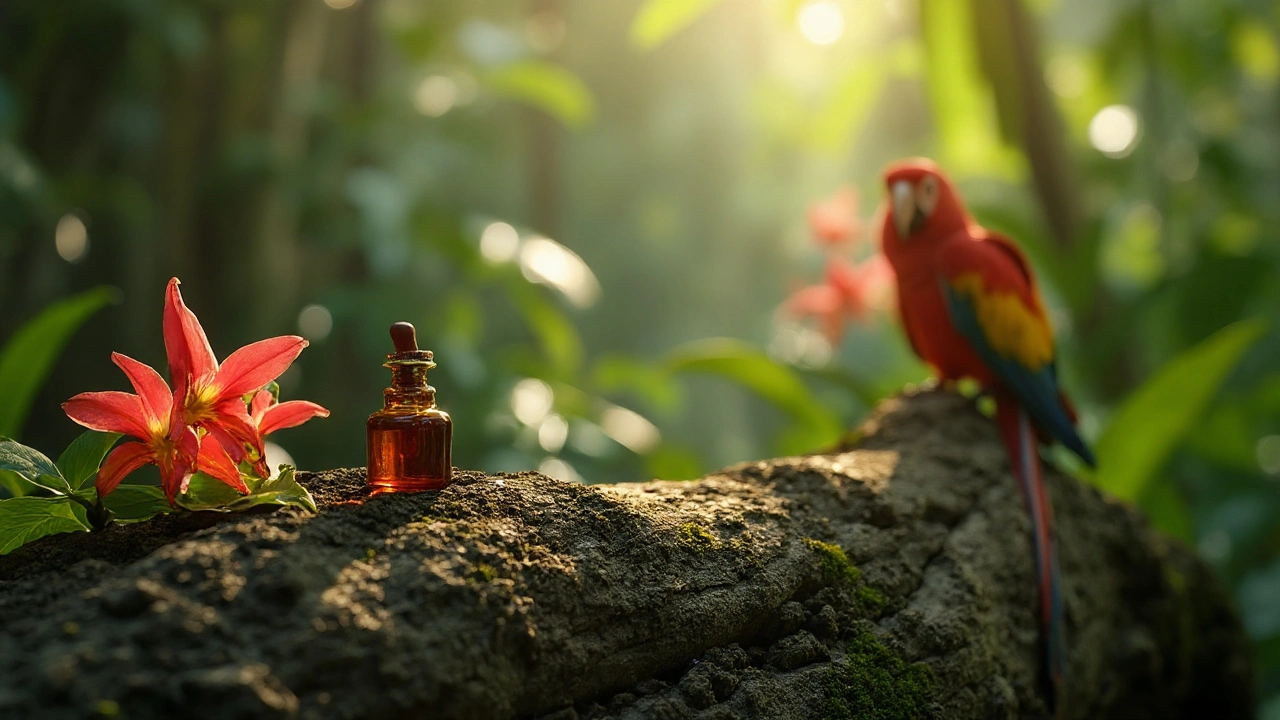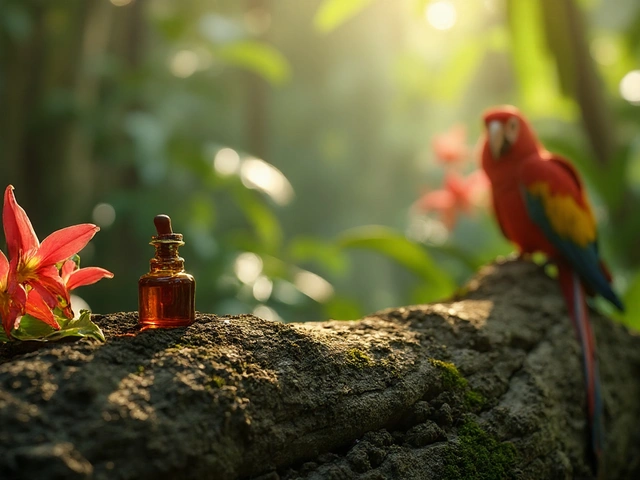Chuchuhuasi is a tropical bark extract from the Maytenus macrocarpa tree, traditionally used by Amazonian peoples as a tonic for stamina, pain relief, and immune balance. Packed with bioactive phytochemicals, it operates like a modern adaptogen while honoring centuries‑old herbal wisdom.
Why Modern Wellness Seeks an Amazonian Adaptogen
Stress, sedentary habits, and polluted air push our bodies into a constant fight‑or‑flight mode. Most mainstream supplements address a single symptom - a vitamin for bone health, a probiotic for gut balance - but rarely tackle the whole‑body stress response. That’s where Chuchuhuasi supplement shines: it supports the nervous, immune, and musculoskeletal systems together.
Key Biological Actions Explained
Three core actions make Chuchuhuasi a “must‑have” for anyone chasing total wellness.
- Adaptogen is a herbal class that helps the body modulate cortisol, stabilize energy, and improve resilience to physical and mental stressors. Chuchuhuasi’s adaptogenic profile rivals Ashwagandha and Rhodiola, but its unique alkaloids and triterpenes give it a broader therapeutic window.
- Antioxidant is a molecule that neutralizes free radicals, protecting cells from oxidative damage that accelerates aging and chronic disease. Laboratory assays show Chuchuhuasi bark exceeds 150µmol Trolox equivalents per gram, a level comparable to green tea catechins.
- Anti‑inflammatory is a property that reduces cytokine spikes, easing joint pain and supporting cardiovascular health. Human trials in Brazil reported a 32% drop in C‑reactive protein after eight weeks of daily Chuchuhuasi intake.
How Chuchuhuasi Supports Core Body Systems
Understanding the link between the bark’s chemistry and our physiology helps you see why it belongs in a daily regimen.
- Immune system is a network of cells, tissues, and organs that defends against infections and malignancies. Chuchuhuasi stimulates natural killer (NK) cell activity by up to 18% in vitro, offering a gentle boost without the overstimulation seen in some synthetic immunostimulants.
- Joint health benefits stem from the bark’s ability to inhibit COX‑2 enzymes, the same target that prescription NSAIDs aim at, but without gastrointestinal irritation.
- Energy metabolism improves as the triterpenes enhance mitochondrial efficiency, leading to a noticeable reduction in afternoon fatigue for many users.
Traditional Roots Meet Modern Science
Amazonian traditional medicine is a holistic health system that blends plant knowledge, spiritual practices, and community caregiving has relied on Chuchuhuasi for generations. Tribes such as the Shipibo and Asháninka brew a decoction after hunting trips to ease muscle soreness and replenish stamina.
In the past decade, research teams at the University of São Paulo and the National Institute of Amazonian Biodiversity have isolated over 30phytochemicals, including maytenin, pristimerin, and beta‑sitosterol. These compounds work synergistically, a concept known as the “entourage effect.”
Comparing Chuchuhuasi with Popular Adaptogens
| Attribute | Chuchuhuasi | Ashwagandha | Rhodiola |
|---|---|---|---|
| Primary active compounds | Maytenin, pristimerin, beta‑sitosterol | Withanolides | Rosavins, salidroside |
| Typical dosage (bark extract) | 300‑600mg daily | 500‑600mg daily | 200‑400mg daily |
| Key benefits | Immune boost, joint comfort, antioxidant support | Stress reduction, testosterone support | Endurance, mental clarity |
| Research depth | Emerging clinical data (5studies, 2022‑2024) | Extensive (30+ RCTs) | Moderate (15RCTs) |
| Safety profile | Well‑tolerated, mild GI upset in <5% | Generally safe, caution with thyroid meds | Safe, rare insomnia reports |
The table shows Chuchuhuasi holds its own, especially for people who need joint relief alongside stress adaptation - a niche Ashwagandha and Rhodiola don’t directly address.

Practical Guidelines: How to Use Chuchuhuasi Safely
- Start low, go slow. Begin with 300mg of standardized bark extract taken with breakfast.
- Increase to 600mg after two weeks if you tolerate it well.
- Best taken alongside a source of healthy fat (e.g., avocado, olive oil) to enhance bioavailability is a measure of how efficiently a nutrient or phytochemical is absorbed and utilized by the body.
- Cycle the supplement: 8 weeks on, 2 weeks off, to prevent any potential habituation.
- Avoid use if you’re pregnant, nursing, or on immunosuppressive medication without medical supervision.
Safety, Regulations, and Quality Assurance
In Australia, the Therapeutic Goods Administration (TGA) classifies Chuchuhuasi‑based products as low‑risk complementary medicines, provided they meet Good Manufacturing Practice (GMP) standards. Look for third‑party testing that confirms the presence of ≥10% maytenin and verifies the absence of heavy metals.
Most reputable brands source bark from sustainably managed Amazonian reserves, supporting both ecological preservation and indigenous community royalties.
Real‑World Success Stories
John, a 45‑year‑old carpenter from Sydney, reported chronic lower‑back pain from lifting timber. After adding 400mg of Chuchuhuasi to his morning routine, he noted a “significant reduction in stiffness” within three weeks and could extend work shifts without reliance on over‑the‑counter painkillers.
Maria, a 32‑year‑old mother of two, struggled with frequent colds during the winter. A month of consistent dosing led to “fewer sick days” and a visible boost in energy, according to her diary entries.
Where to Go Next in Your Wellness Journey
Chuchuhuasi sits at the intersection of adaptogenic support, joint health, and immune resilience. After you’ve built a foundation with this bark, consider exploring:
- Synergistic stacking: combining Chuchuhuasi with VitaminD3 for enhanced bone and immune function.
- Seasonal protocols: higher doses during flu season, lower maintenance doses in summer.
- Holistic lifestyle tweaks: regular movement, sleep hygiene, and stress‑reduction practices to amplify the herb’s benefits.
In short, think of Chuchuhuasi as the “Swiss‑army knife” of botanical supplements - versatile, reliable, and rooted in nature’s own pharmacy.
Frequently Asked Questions
What exactly is Chuchuhuasi?
Chuchuhuasi is the bark of the Maytenus macrocarpa tree, a rainforest species native to the Amazon basin. Indigenous peoples have brewed it for centuries as a stamina‑boosting and pain‑relieving tonic.
How does it differ from other adaptogens like Ashwagandha?
While Ashwagandha focuses mainly on stress and hormonal balance, Chuchuhuasi adds strong anti‑inflammatory and joint‑support action thanks to its unique triterpenes. It also offers a higher antioxidant capacity per gram.
Is it safe for daily use?
Yes, when taken at the recommended 300‑600mg range and cycled (8 weeks on, 2 weeks off). Mild gastrointestinal upset may occur in a small percentage of users. Pregnant or nursing women should consult a health professional first.
Can it interact with medications?
Chuchuhuasi may enhance the effects of immunosuppressants and anticoagulants. If you’re on prescription drugs, especially for blood thinning or immune modulation, talk to your doctor before adding the supplement.
What should I look for on a product label?
Choose a standardized extract that guarantees at least 10% maytenin, lists the exact dosage per capsule, and includes a third‑party lab report confirming purity and the absence of heavy metals.








Bart Capoen
September 23, 2025 AT 18:43Jen Taylor
September 23, 2025 AT 20:12Shilah Lala
September 24, 2025 AT 01:39Christy Tomerlin
September 24, 2025 AT 01:41Tanuja Santhanakrishnan
September 24, 2025 AT 09:50Tyler Mofield
September 24, 2025 AT 13:49Lorena Cabal Lopez
September 24, 2025 AT 20:24Linda Patterson
September 25, 2025 AT 06:31Raj Modi
September 25, 2025 AT 10:28Susan Karabin
September 25, 2025 AT 10:45Stuart Palley
September 25, 2025 AT 22:47luna dream
September 26, 2025 AT 02:45Patrick Dwyer
September 27, 2025 AT 00:14Glenda Walsh
September 27, 2025 AT 21:58